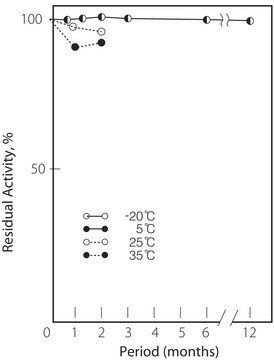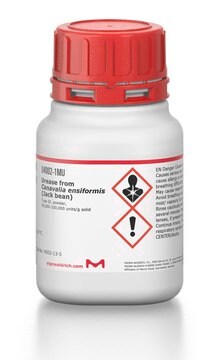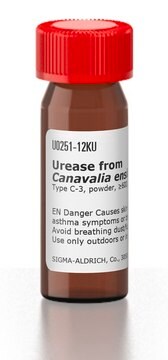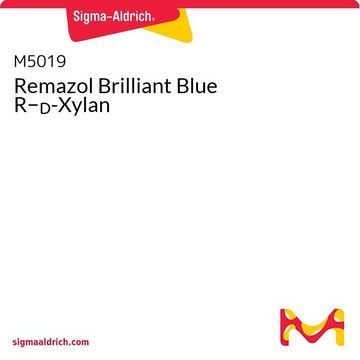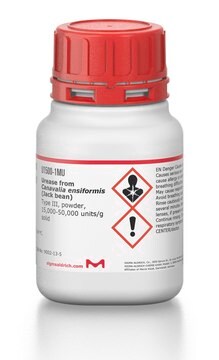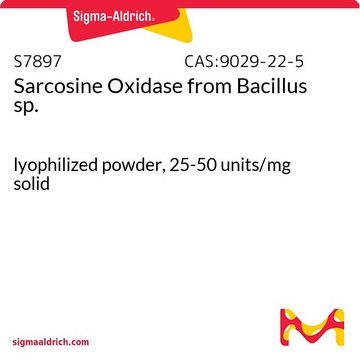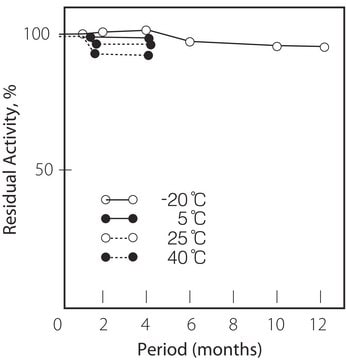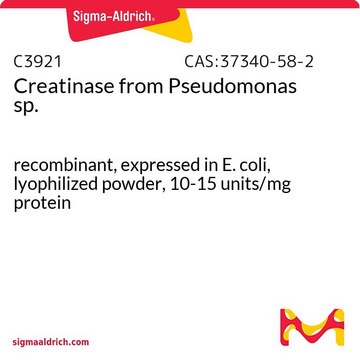C9409
Creatinine Deiminase microbial
lyophilized powder, ≥25 units/mg protein
Sinónimos:
Creatinine Deaminase
Iniciar sesiónpara Ver la Fijación de precios por contrato y de la organización
About This Item
Número de CAS:
Número CE:
Número MDL:
Código UNSPSC:
12352204
NACRES:
NA.54
Productos recomendados
Formulario
lyophilized powder
Nivel de calidad
actividad específica
≥25 units/mg protein
mol peso
~260 kDa
composición
Protein, ≥15% biuret
temp. de almacenamiento
−20°C
Categorías relacionadas
Aplicación
Creatinine Deiminase microbial has been used:
- to immobilize aminosilylated glass beads based biosensor for ammonia/ammonium and creatinine detection in urine
- in creating creatinine-sensing membrane for biophysical studies
- to investigate the bioelectronic tongue for the simultaneous determination of urea, creatinine and alkaline ions in clinical samples
Creatinine deiminase has been used in a study to assess the application of a creatinine-sensitive biosensor for hemodialysis control. Creatinine deiminase has also been used in a study to investigate the bioelectronic tongue for the simultaneous determination of urea, creatinine and alkaline ions in clinical samples.
Acciones bioquímicas o fisiológicas
Creatinine deiminase catalyzes the hydrolysis of creatinine to methylhydantoine and ammonia.
Propiedades físicas
Isoelectric point : 4.4
Michaelis constant : 3.5 x 10‾3M (Creatinine)
Structure : 6 subunits per mol of enzyme
Inhibitors : Ag+,Hg++, o-phenanthroline,monoiodoacetate
Optimum pH : 8.5 – 9.5
Optimum temperature : 65 – 75°C
pH Stability : pH 7.0 – 11.0 (30°C, 20hr)
Thermal stability : Below 65°C (pH 7.5, 1hr)
Michaelis constant : 3.5 x 10‾3M (Creatinine)
Structure : 6 subunits per mol of enzyme
Inhibitors : Ag+,Hg++, o-phenanthroline,monoiodoacetate
Optimum pH : 8.5 – 9.5
Optimum temperature : 65 – 75°C
pH Stability : pH 7.0 – 11.0 (30°C, 20hr)
Thermal stability : Below 65°C (pH 7.5, 1hr)
Definición de unidad
One unit will hydrolyze 1.0 μmole of creatinine to N-methylhydantoin and NH3 per min at pH 7.5 at 37 °C in a coupled system with L-glutamic dehydrogenase.
Forma física
Lyophilized powder containing mannitol as stabilizer
Código de clase de almacenamiento
11 - Combustible Solids
Clase de riesgo para el agua (WGK)
WGK 3
Punto de inflamabilidad (°F)
Not applicable
Punto de inflamabilidad (°C)
Not applicable
Equipo de protección personal
Eyeshields, Gloves, type N95 (US)
Elija entre una de las versiones más recientes:
¿Ya tiene este producto?
Encuentre la documentación para los productos que ha comprado recientemente en la Biblioteca de documentos.
Anne K Bendt et al.
Archives of microbiology, 181(6), 443-450 (2004-05-19)
In order to utilize different nitrogen sources and to survive situations of nitrogen limitation, microorganisms have developed several mechanisms to adapt their metabolism to changes in the nitrogen supply. In this communication, the use of creatinine as an alternative nitrogen
Hybrid biosensors for clinical analysis and fermentation control.
I Karube
Methods in enzymology, 137, 131-138 (1988-01-01)
T W Esders et al.
The Journal of biological chemistry, 260(7), 3915-3922 (1985-04-10)
Creatinine iminohydrolase (EC 3.5.4.21), which catalyzes hydrolysis of creatinine to N-methylhydantoin and ammonia, was purified from Flavobacterium filamentosum. The average molecular weight of the purified enzyme was 272,480, and the subunit molecular weight was 44,300. Extensive specificity studies indicated that
[Immobilized enzyme reactors--their use in chemiluminescence detection].
M Tabata et al.
Tanpakushitsu kakusan koso. Protein, nucleic acid, enzyme, 31(3), 220-229 (1986-03-01)
Hsiao-Chung Tsai et al.
Analytical biochemistry, 334(1), 183-192 (2004-10-07)
An optical array biosensor encapsulated with hydrolase and oxidoreductase using sol-gel immobilization technique has been fabricated for simultaneous analysis and screening of multiple samples to determine the presence of multianalytes which are clinically important in relation to renal failure. Urease
Nuestro equipo de científicos tiene experiencia en todas las áreas de investigación: Ciencias de la vida, Ciencia de los materiales, Síntesis química, Cromatografía, Analítica y muchas otras.
Póngase en contacto con el Servicio técnico